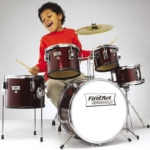Music is calling you, but there are so many instruments or other musical crafts to choose from! Whether you’re three or 83, taking up string lessons is a good place to start.
Here are 3 reasons to take strings lessons at any age
1) Improves Your Coordination & Dexterity
To play the violin properly, you must first develop the careful and necessary coordination to handle and play it. Violins are relatively small instruments; they’re fretless, have curved fretboards, and can be played with or without a bow – all of which mean you need to have a mindful hand (and chin) when practicing at home or attending instructor-led lessons.
As you learn to play the violin, you’ll also find this instrument requires distinctive techniques to master it, including:
- Rhythm
- Timing
- Bowing
- Fingering
- Plucking
- Musicality
2) Enhances Your Understanding of Music
Violins are commonplace in many musical genres, spanning from orchestral to folk, pop to country, and even alternative and heavy metal. It’s an amazingly versatile instrument.
As you develop your violin-playing abilities, you’ll also come to understand how learning to play the violin is actually a gateway to music as a whole. A great way to practice a new skill – or to just take a break from Mozart – is to find a piece of sheet music that speaks to you and learn it (pro tip: check out Amazon or your local music store). You may be surprised to find that most compositions come with a version for violin.
Compared to only listening to the violin on Spotify (or cassette, CD, vinyl, etc.), actually playing violin in non-traditional styles gives you a better understanding of the music to further develop your musicality. With so many songs to learn in so many genres, learning to play the violin is a musical gift that keeps on giving.
But, we get it if you’re not quite ready to try out a song your instructor didn’t assign to you. Another way to broaden your musical horizons—and thus give you the skills to immerse yourself in new musical styles more quickly—is to check out YouTube. If you’ve been asking yourself “Should I learn to play the violin?” for some time, you’ve likely come across Lindsey Stirling, a master violinist who became known for her explosive take on popular music.
3) Builds Skills Transferable to All Other Instruments
The violin is generally considered the most difficult mainstream string instrument to play because it’s the smallest string instrument in the violin family and has a unique architecture. And while it’s not heavy, the violin can be awkward to properly hold. As noted earlier, its fretless, curved fretboard makes fingering, bowing, and plucking a challenge; the small size of the violin makes it even harder. But – there is a HUGE silver lining.
Violin lessons for beginners provide the necessary groundwork and skillset to improve your coordination and dexterity, which inevitably help to learn to play other instruments – strings, percussion, woodwind, and even brass! #bonus
Where should I learn to play the violin?
Only at Omaha School of Music & Dance will you and/or your child learn from a full-time, university-taught violin teacher who lives and breathes string instruments. Their passion for music is clear, and it transfers to their students. Each week, your violin instructor will review homework (AKA what was practiced at home) and move on to the next lesson to keep you learning and progressing.
Interested in learning to play the violin here at Omaha School of Music & Dance? Here’s how you can register:
- Drop by our studio
- Give us a call at (402) 515-9639
- Or Contact Us Here



